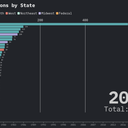As of January 17, 2018
In 2016, the Supreme Courts of Florida and Delaware declared their death-penalty statutes to be unconstitutional because they permitted trial judges to impose the death penalty based upon a sentencing jury’s non-unanimous recommendation for death. Those decisions left Alabama as the only state that permitted trial judges to impose a death sentences based upon a jury’s non-unanimous sentencing recommendation.
But Alabama is not the only state that permits judges to decide what sentence to impose if a capital-sentencing jury cannot reach a unanimous sentencing verdict. Missouri and Indiana consider the lack of unanimity to constitute a “hung jury” and then mandate that the court independently decide what sentence to impose if a capital-sentencing jury cannot reach a unanimous sentencing verdict.
No Missouri jury has imposed a death sentence since 2013, but Missouri state trial judges imposed death sentences in two cases in a four-month period between late 2017 and early 2018 under this hung-jury provision. In October 2017, a St. Charles County trial judge sentenced Marvin Rice to death after his jury deadlocked 11 – 1 in favor of a life sentence. In January 2018, a Greene County trial judge sentenced Craig Wood to death after his jury deadlocked 10 – 2 in favor of death.
DPIC has reviewed the death-penalty statutes of the 31 states that permit capital punishment and the federal death penalty statute to determine how each jurisdiction proceeds when a capital-sentencing jury does not reach a unanimous verdict in the penalty phase of a capital trial. This is what we found:
The laws of more than 70% of jurisdictions that permit capital punishment (22 states, plus the federal government) mandate an automatic life sentence if a jury cannot reach a unanimous sentencing verdict. Five states allow the state another opportunity to seek death with a new sentencing hearing before another jury. Two other states — Indiana and Missouri — remove the sentencing decision from the jury following a deadlock and transfer the decision-making authority to the judge. Another two states — Montana and Nebraska — reserve the sentencing power to the judge in all death-penalty cases.
Here is a state-by-state breakdown of the applicable law:



